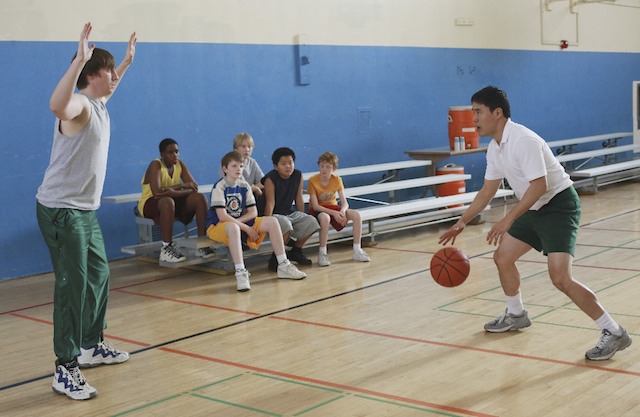I’m not sure about other people’s moms, but my own doesn’t really have a memory from her childhood that isn’t also a morality tale. I don’t think that her storytelling has been an intentional approach to parenting so much as a reflection of her worldview. My mom was raised in a pious household which fused Confucian and Taoist values into Buddhism. Combined, the religious philosophy she, and I, were raised with can be boiled down to two central takeaways: Devote yourself to your parents’ happiness above all else, and do well in school.
I was reminded of my mom’s management of her childhood memories during episode 12 of "Fresh Off the Boat" when Jessica and Louis are conscripted into volunteer duty at their boys’ schools. Jessica gets assigned to the school play, a forcefully innocuous production that kids have been performing, "for six years running without offending anyone–and that includes our Italian families!" explains the school principal.
One glimpse at the undisciplined, egalitarian affair has Jessica turning up her nose in snobby disbelief. If an extracurricular activity isn’t contributing directly to her sons’ educational enrichment, it’s off the table. Doubly so if that after-school activity is in theater, the professional pursuit of which will only lead to ruination. (Ruination, in Jessica’s mind, is any non-attorney or physician career, or barring that, any career that doesn’t also promise steady pay and health insurance.)
"Why?! You’re not going to become actors," Jessica tells her baby sons back at home. "You think they’re going to put two Chinese boys on TV?"
The cameras give a quick shot of Forrest Wheeler and Ian Chen, the sweet-faced actors who play Eddie’s younger brothers Emery and Evan, respectively. So begins the first of the episode’s meta references to "Fresh Off the Boat"s historic placement in Hollywood history. The references are played for wink-nudge humor and creep toward a more self-congratulatory effect, but thankfully stop just short of obnoxiousness.
Jessica tells the boys the narrow roles they’d be able to play in Hollywood: "Maybe there’s a nerdy friend or a magical thing where somebody wanders into a Chinatown, but no."
"The play is fun?" Evan offers in return.
"Let me tell you a story about fun," Jessica responds, seguing into a story about being denied a creepy-sounding knockoff My Little Pony and playtime as a child but learning "something even better" in exchange: a strong work ethic. "She focused on her studies and became the first one in her family to go to college," Jessica says, speaking in the third person to her oblivious sons, and burning with the wistfulness of a grown up girl who still wishes she’d gotten more playtime as a kid. Jessica then returns to her boys’ school, and goes on to railroad the production and rewrite the whole thing into a cautionary tale (starring her two young boys, of course) about what happens when naive children pursue their creative dreams.
My mom tells a story about how as a kid she marveled at her older sister who would lock herself in a vacant next-door apartment–the better to ward off distractions–for hours at a time so she could study, and knock out those A’s. She tells us how my grandmother instilled in her an unwavering sense of duty to always look after her youngest brother, who has a disability.
My mom also tells a story about how, inspired by her physician dad, she applied to medical school, and out of respect for her mom, who wanted her to have a job that would allow her to be home with family, she also applied to pharmacy school. Her heart fell when she was accepted to both. Medicine was what she really wanted to pursue, but going meant that she’d have to break her own mother’s heart. As with all my mom’s other stories, filial piety figures largely here. But as I’ve gotten older, I’ve learned to see it also as a story of self-determination.
My mom went on to medical school, after all, and was one of just a few women in her classes. She was a real trailblazer in her family and in our community. Eventually my grandmother came around too, and in my mom’s telling it was she who would first notice the signs of the diabetes in her mom.
As I get older, I’ve learned that the stories we tell about ourselves are often only in part for our listeners’ benefit. They’re just as powerful as salves for our own wounds, be it out of yearning for a different past or in trying to make peace with our current selves. I’m not unlike my mom. And I’d wager that my mom’s not unlike Jessica Huang.
By the end of the episode, Jessica and Louis give in to their American children, and Louis helps fill that purple pony-shaped hole in Jessica’s childhood heart. Their kids may be chafing against the strict childhood their parents’ envisioned for them, but Jessica and Louis come around to the idea that may not be the worst thing.
Also, separately, completely aside from all this, I would also recommend this episode for the "Shaolin Soccer" tribute alone.
